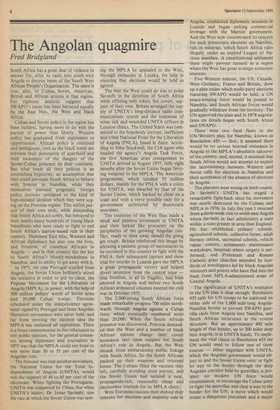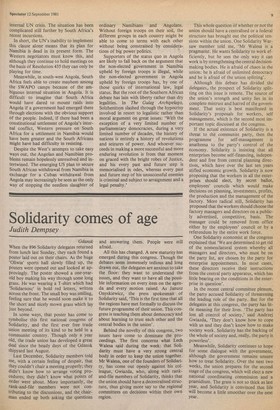The Angolan quagmire
Fred Bridgland
South Africa has a great deal of violence to answer for, after its raids into south-west Angola to destroy bases of the South West African People's Organisation. The same is true, also, of Cuban, Soviet, American, British and African actions in that region. For rigorous analysis suggests that SWAPO's cause has been betrayed equally by the East bloc, the West and black Africa.
Cuban and Soviet policy in the region has been ruthless, having more to do with the pursuit of power than liberty. Western policy has graduated from supineness to opportunism. African policy is confused and ambiguous, torn as the black states are between their detestation of apartheid and their awareness of the dangers of the Soviet-Cuban presence on their continent. But what binds all their policies is an astonishing hypocrisy, an assumption that they could persuade South Africa to behave with honour in Namibia, while they themselves pursued pragmatic foreign policy interests unrelated to the kind of high-minded idealism which they were urging on the Pretoria regime. This selfish pursuit of their own ends, while demanding that South Africa act nobly, has betrayed to their deaths many hundreds of young black Namibians who were ready to fight to end South Africa's narrow-based rule in their country. Dishonest East bloc, Western and African diplomacy has also cost the lives, and freedom, of countless Africans in Angola — and in that country lies the key to South Africa's bloody-mindedness in Namibia, and its ability to get away with it.
In 1975, the year Portugal scuttled from Angola, the Soviet Union brilliantly seized the initiative in order to put its client, the Popular Movement for the Liberation of Angola (MPLA), in power, with the help of 300 million dollars' worth of Soviet arms and 20,000 Cuban troops. Elections scheduled under the independence agreement signed by Portugal and three Angolan liberation movements were never held; and far from reviving the election idea the MPLA has outlawed all opposition. There is a brute commonsense in this reluctance to test public opinion, for the general consensus among diplomats and journalists in 1975 was that the MPLA could not hope to win more than 30 to 35 per cent of the Angolan vote.
The forecast was that another movement, the National Union for the Total Independence of Angola (UNITA), would win the support of 40 to.45 per cent of the electorate. When fighting the Portuguese, UNITA was supported by China, but when UNITA's leader, Dr Jonas Savimbi, saw the rate at which the Soviet Union was arm ing the MPLA he appealed to the West, through embassies in Lusaka, for help in ensuring that elections would be held as agreed.
The best the West could do was to point Savimbi in the direction of South Africa while offering only token, but covert, support of their own. Britain arranged the supply of UNITA's long-distance radio communications system and the treatment of some sick and wounded UNITA officers in London clinics. The United States was committed to the hopelessly corrupt, inefficient and tribal National Front for the Liberation of Angola (FNLA), based in Zaire. According to John Stockwell, the CIA agent who headed the agency's Angola Task Force, the first American arms consignment to UNITA arrived in August 1975, fully eight months after the Soviet Union began ferrying weapons to the MPLA. The American programme, which totalled 32 million dollars, mainly for the FNLA with a token for UNITA, was dwarfed by that of the Soviet Union, which backed its client on a scale and with a verve possible only for a government unfettered by democratic restraints.
The countries of the West thus made a small and painless investment in UNITA and then lurked like procurers on the peripheries of the growing Angolan conflict, ready to slink away should the going get rough. Britain reinforced this image by allowing a pathetic group of mercenaries to be recruited in this country to fight with the FNLA: their subsequent capture and show trial for murder in Luanda gave the MPLA a great propaganda victory and helped divert attention from the central issue — that freedom, in all its fragility, had been aborted in Angola well before two South African armoured columns entered the civil war in October 1975.
The 2,000-strong South African force made remarkable progress 700 miles northwards through Angola against a Cuban force which eventually numbered more than 20,000. When the South African presence was discovered, Pretoria demanded that the West and a number of black African nations change their covert assistance into open support for South Africa's role in Angola. But the West shrank from embarrassing public linkage with South Africa. So the South Africans packed up their weapons and returned home. The Cubans filled the vacuum they left, carefully avoiding close pursuit, and the Soviet Union had secured a neat, propaganda-rich, reasonably cheap and electionless triumph for its MPLA client.
West European nations then shelved their concern for elections and majority rule in Angola, established diplomatic missions in Luanda and began seeking commercial leverage with the Marxist government. And the West now concentrated its concern for such democratic elections on Namibia, rich in minerals, which South Africa rules illegally under an expired League of Nations mandate. A constitutional settlement there might prevent turmoil in a region where the West has great strategic economic interests.
Five Western nations, the US, Canada, West Germany, France and Britain, drew up a plan under which multi-party elections featuring SWAPO would be held, a UN peace-keeping force would be posted to Namibia, and South African forces would gradually withdraw from the territory. The UN approved the plan and in 1978 negotiations on details began with South Africa and SWAPO.
There were two fatal flaws in the UN/Western plan for Namibia, known as Resolution 435 — first, it assumed there would be no serious internal resistance in Angola to the MPLA's absolutist takeover of the country, and, second, it assumed that South Africa would not attempt to exploit the inconsistency between Western and Soviet calls for elections in Namibia and their acceptance of the absence of elections in Angola.
The planners were wrong on both counts. Dr Savimbi's UNITA has staged a remarkable fight-back since his movement was nearly destroyed by the Cubans and MPLA in 1976. In July this year I returned from a three-week visit to south-east Angola where Savimbi in fact administers a state within a state greater in area than England. He has established primary schools, agricultural schools, collective farms, adult literacy centres, secretarial schools, vehicle repair centres, armaments maintenance workshops, hospitals where surgery is performed, and Protestant and Roman Catholic grass churches attended by hundreds of worshippers led by black Angolan ministers and priests who have fled into the bush from MPLA-administered areas of Central Angola.
The significance of UNITA's resistance to the UN plan is clear enough. Resolution 435 calls for UN troops to be stationed on either side of the 1,000 mile-long AngolaNamibia border to prevent SWAPO guerrilla raids from Angola into Namibia, and South African incursions in the reverse direction. But an approximate 400 mile length of that border, up to 200 miles deep into Angola, is in UNITA hands. To implement the vital clause in Resolution 435 the UN would need to follow one of three courses — either negotiate with UNITA, which the Angolan government would object to and the Soviet Union veto; or fight its way to the border through the deep Angolan corridor held by guerrillas, a prospect no modern UN force would countenance; or encourage the Cuban army to fight the guerrillas and clear a way to the border for the UN, a move which would create a dangerous precedent and a major internal UN crisis. The situation has been complicated still further by South Africa's recent incursions.
In short, the UN's inability to implement this clause alone means that its plan for Namibia is dead in its present form. The Western negotiators must know this, and although they continue to hold meetings on the basis of Resolution 435 they can only be playing for time.
Meanwhile, in south-west Angola, South Africa feels able to create mayhem among the SWAPO camps because of the ambiguous internal situation in Angola. It is difficult to imagine that South Africa would have dared to mount raids into Angola if a government had emerged there through elections with the obvious support of the people. Indeed, if there had been a constitutional settlement of Angola's internal conflict, Western pressure on South Africa for a settlement in Namibia would have been greater and the South Africans might have had difficulty in resisting.
Despite the West's attempts to take easy ways out, the Angolan and Namibian problems remain hopelessly unresolved and intertwined. The emerging US plan to secure South African withdrawal from Namibia in exchange for a Cuban withdrawal from Angola may increasingly be seen as the only way of stopping the needless slaughter of ordinary Namibians and Angolans. Without foreign troops on their soil, the different groups in each country might be able to come to terms with each other without being constrained by considerations of big power politics.
Supporters of the status quo in Angola are likely to fall back on the argument that the non-elected government in Namibia upheld by foreign troops is illegal, while the non-elected government in Angola upheld by foreign troops has, by one of those quirks of international law, legal status. But the root of the Southern African debate has lain with liberty rather than dry legalities. In The Gulag Archipelago, Solzhenitsyn slashed through the hypocrisy involved in resort to legalistic rather than moral argument on great issues: 'With the exception of a very limited number of parliamentary democracies, during a very limited number of decades, the history of nations is entirely a history of revolutions and seizures of power. And whoever succeeds in making a more successful and more enduring revolution is from that moment on graced with the bright robes of Justice, and his every past and future step is memorialised in odes, whereas every past and future step of his unsuccessful enemies is criminal and subject to arraignment and a legal penalty.'

































 Previous page
Previous page